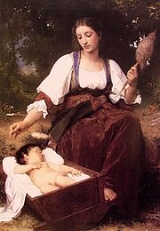
, usually sung to young children before they go to sleep, with the intention of speeding that process. As a result they are often simple and repetitive. Lullabies can be found in every culture and since the ancient period.
Typically a lullaby is in triple metre
, or in a compound metre like 6/8. Tonally, most lullabies are simple, often merely alternating tonic
and dominant
harmonies: Because the intended effect is to put someone to sleep, wild chromaticism
would be somewhat out of character.
Many Christmas carols are designed as lullabies for the infant Jesus, the most famous of them being "Silent Night
".
In 1072, Turkish writer Mahmud al-Kashgari mentions old Turkish lullabies as 'balubalu' in his book Dīwānu l-Luġat al-Turk (Compendium of the languages of the Turks).
"Anymore, no one's mind is their own. You can't concentrate. You can't think. There's always some noise worming in. Singers shouting. Dead people laughing. Actors crying. All these little doses of emotion. Someone's always spraying the air with their mood."
![]()
"Our footsteps echo against the concrete floor. The steel roof hums with rain. And she says, 'Don't you feel, somehow, buried in history?'"
![]()
"Imagine the books burning. And tapes and films and files, radios and televisions, will all go into that same bonfire. All those libraries and bookstores blazing away in the night. People will attack microwave relay stations. People with axes will chop every fiber-optic cable."
![]()
"The muffled thunder of dialogue comes through the walls, then a chorus of laughter. Then more thunder. Most of the laugh tracks on television were recorded in the early 1950s. These days, most of the people you hear laughing are dead."
![]()
"Power corrupts. And absolute power corrupts absolutely. So just relax, Helen Boyle told me, and just enjoy the ride. She said, "Even absolute corruption has its perks."
![]()
"The trick to forgetting the big picture is to look at everything close-up."
![]()
"There are worse things you can do to the people you love than kill them."
![]()

